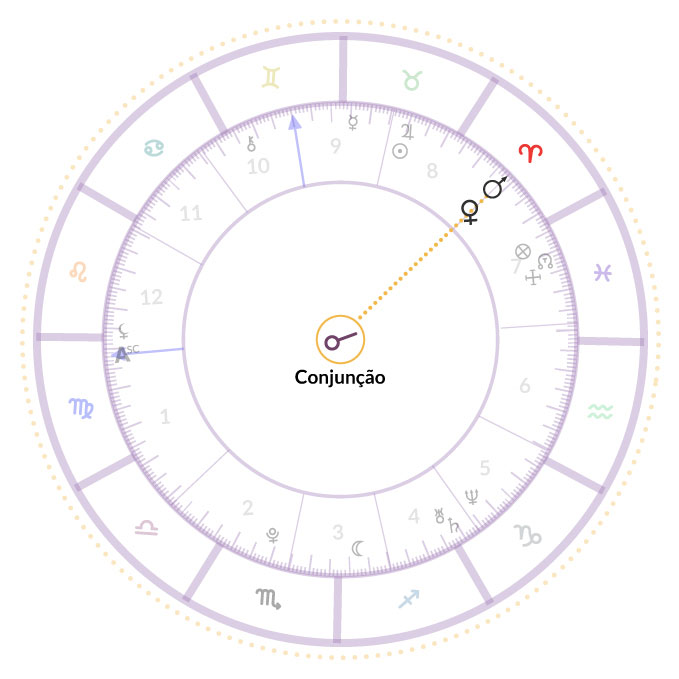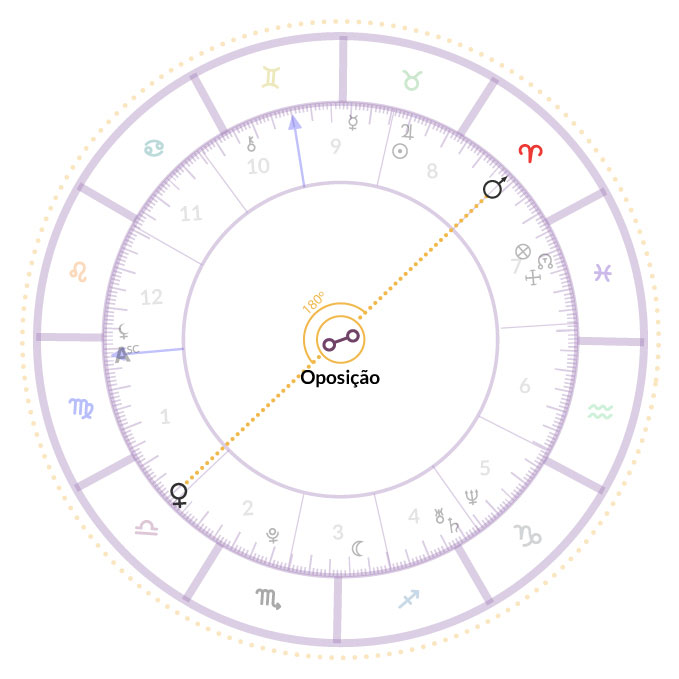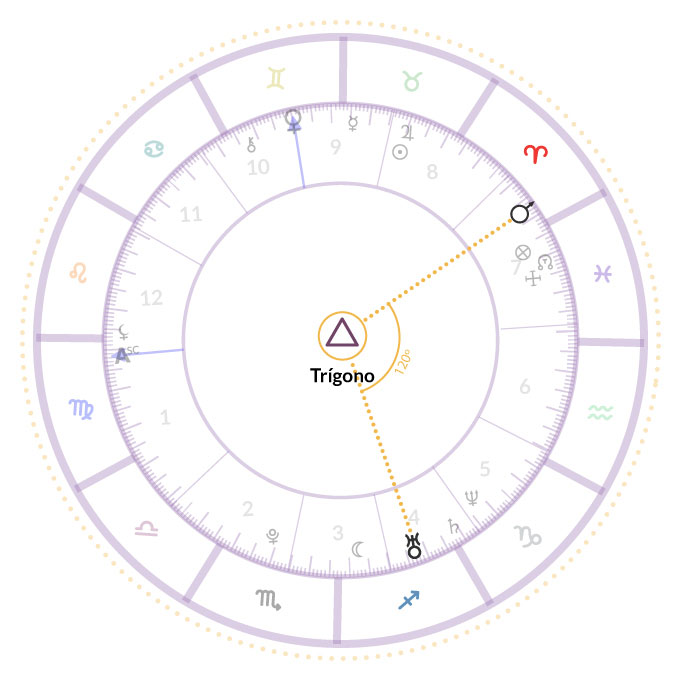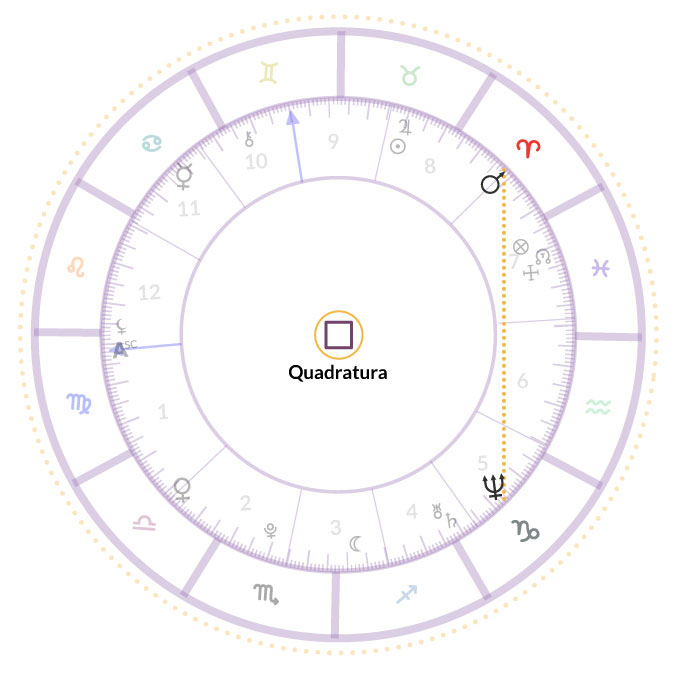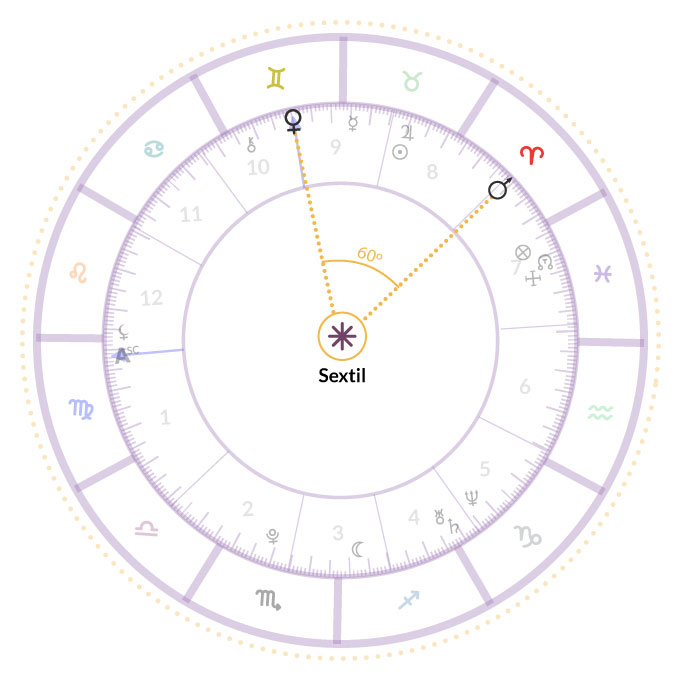Veja seu Mapa Astral Grátis!
Already an Astrolink member?
How to Read your Birth Chart
Complete guide for you to learn how to read your Birth Chart
light mode
21 minutes of reading
So you made your Birth Chart on Astrolink, came across a lot of information and asked yourself “how to read and interpret all this?”? We will help you!
All influences and trends are in the birth chart, like a fingerprint of the exact moment of your birth, but we know that it's a lot to take in, and if you're a beginner, you may have a lot of questions. After all, what do planets, signs, houses and aspects represent?
One of the first major challenges for astrology lovers or enthusiasts is to know how the synthesis and complete reading of an birth chart works.
We often come across people who reduce the scope of astrology by dividing all human beings into just 12 categories: each sign. But, if we only add the Ascendant to this equation, the number already increases to 144 combinations. And that's just the tip of the iceberg, as the position of the ruler of this Ascendant, the Astrological Houses, planetary aspects and many other variables, take astrological analysis to a whole different level.
To help you read your Birth Chart, your friends and the people you are interested in, we are going to show you important things to take into consideration so that you can have a well-synthesized general idea.
Check out in this guide the basic step-by-step on how to read your Birth Chart and what each part of it means.
To begin with, what is an Birth Chart?
This seems like a very simple question, but it has a lot of depth if we think about it calmly. In the most basic sense, we can ask: is an Birth Chart just a guide to our inner world, our psychological composition and our personality? Or is it a map of our entire life, our destiny, the happenings and events of life, career, everyday life and family environment?
And the answer is: both. In fact, the birth chart describes how we perceive, experience, interpret and interact with reality. The main purpose of the dynamic is to show the possible performance of energy fields that are constantly generated around us due to the Earth's positioning in relation to other stars - and how they will interact with us during life.
A map can be considered as a kind of "basic self-knowledge manual", something that helps us to walk our path towards personal evolution. But one thing is certain: interpretation cannot be seen as something objective, black and white. There are many influences and nuances to consider along with our subjectivity, intuition, conscience, feelings and worldview.
The astrological mechanics
Every celestial body has its own electromagnetic waves and gravitational action. Just as the position of the Moon influences the tides, other different influences reach us, depending on the position that the Earth is in relation to the cosmos.
We are all born in a different place on the globe and we are moving all the time through time and space, experiencing different interactions at all times: the Earth rotates on its own axis and around the Sun, along with other planets in our solar system. This one is also rotating around the center of the galaxy, along with other systems, in an eternal spiral.
The planets and signs, with their own meanings within the study of astrology, represent certain archetypal principles that work together according to the cosmic situation of a given moment in space-time, interacting with us according to their strengths, weaknesses, proposals and capabilities.
The sign Mercury is in, for example, shapes the way we capture and transmit information and the functioning of our nervous system. The Astrological House that Neptune is in tends to become more blurred and nebulous in the way we experience it.
Due to the individual combinations of the entire context of the map and in our subjective way of experiencing reality, certain potentials develop more fluidly and others do not.
Analyzing our Birth Chart can bring us more awareness, but like everything else in life, we shouldn't be totally attached to it so that we don't put the responsibility for everything that happens in our lives, on the stars.
It is important to understand that, in fact, there are no negative aspects or positions that will perpetually harm us. Even if certain configurations can demand more energy from us, leave us exhausted, limited or weak, every challenge carries a large amount of energy being released within us when it is solved. We should not be afraid of aspects considered more tense, as they mean that we have things to learn and evolve throughout our current existence.
What astrology basically says is this: we are an extension of the cosmos operating in its most perfect order. The word "cosmetic" in its contemporary context comes from this idea, as it derives from the Greek word "cosmos", which basically means "beauty", "order", "harmony", "organization".
The universe is indeed a beautiful thing working within its own "organized chaos". We are all a kind of extension of the universe, the human manifestation of it in a certain time and place. As tools of your timeless needs, we are the universe expressing and experiencing itself.
It seems like something difficult to understand, but remember that our senses are very limited. We can see very little of the electromagnetic spectrum and hear even less. Some animals, for example, cannot see certain colors because they do not have the necessary receptors to do so.
And whatever we experience, we do with our senses. Colors and sound do not exist in themselves - we have to create and interpret them in our brains and minds. Everything is composed only of electromagnetic waves until we manage to translate them into concepts such as sound, sight, taste, smell, etc. There are many other energies that we are not aware of, but that doesn't mean they don't exist.
Astrology carries at its core the willingness to try to touch the intangible through symbols and archetypes that can translate, in a human language, all this energetic interaction, drawing a parallel between the macrocosm and our microcosm, our mundane existence.
How to interpret the planets in the birth chart
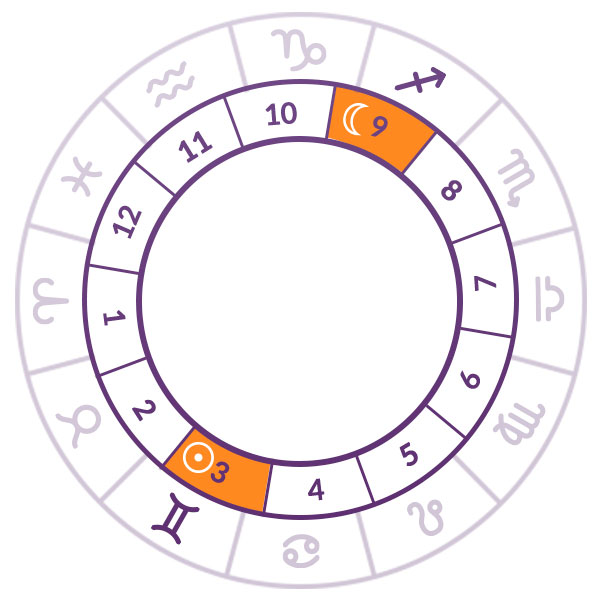
Sun in Gemini at House 3, Moon in Sagittarius at House 9
The birth chart is basically a combination of planets, signs, houses and the interaction between them all. In order to correctly read our birth chart, it is essential to understand some basic things, such as the quality of the planets that make it up and what each one of them has to tell us.
In astrology, planets are the parts of our psyche that animate and shape us, that drive our performance in life. They are archetypes that act differently. Every planet in astrology is a kind of actor, a separate part within us that plays a certain role in our lives. For example, the Sun is the Father and says about our primordial, luminous essence, our center of power. The Moon is the Mother and says about our inner essence, our emotional mechanics and habits. Venus talks about how we express and attract affection and our perception of beauty and values, Mercury shows how we think and communicate, etc.
Here's a brief explanation of each of the major planet themes in astrology:
Want to know how this information can affect your life?
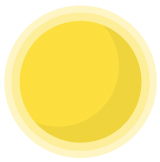 Sun
Sun
The Sun is the central star of our birth chart, it is the One principle. It is the Father, considered the centralizing part of the map and represents our basic essence, through which other factors will interact. Therefore, when we say that someone is "Aryan", we really mean that the person has the Sun positioned in some degree of the sign of Aries in his birth chart.
 Ascendant
Ascendant
The ascendant is not specifically a planet, but the cusp (initial line) of the 1st house in the birth chart, being a very important placement. It means our basic temperament, appearance, the mask we wear on a daily basis, our projected image, that is, how we are seen by people and the first impression we make. It's our first demonstration in the world and it says a lot about how we started things.
 Moon
Moon
The Moon represents our instinctual nature, the world of emotions, feelings, our behavior at home and in our private world. The Moon's energy moves with our intimacy, it is what gives us sensitivity, and intuition and says a lot about how we nourish, ourselves and the environment that surrounds us.
 Mercury
Mercury
Mercury is the planet that governs our intellect and shows how we communicate. By interpreting it in our birth chart, it is possible to reveal something about the way we think, how our reasoning works, what is our way of communicating with other people, and how we assimilate information. He is considered the "messenger of the gods".
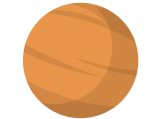 Venus
Venus
Venus offers important information about the way we express our feelings in interpersonal relationships, what we do to attract affection, our perception of beauty, our behavior with values, money, and chattels and the mode of operation in love. It says a lot about what we consider beautiful and what our subtleties are.
 Mars
Mars
Mars brings us information about our driving force, our active and warrior side, our instinct to fight and defend, our active sexual behavior and our motivation to act and succeed. It is the planet that sets the tone for our propulsion and our desires.
 Jupiter
Jupiter
Jupiter is considered the "great benefic" in astrology, the planet that expands what it touches. In the birth chart, it says a lot about what we cherish as something bigger and higher, our luck and capabilities, what our spirit really values, our optimism and way of expansion. It gives a positive impulse in the area of life in which it is positioned, generating benefits.
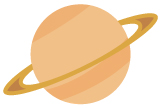 Saturn
Saturn
Saturn is the opposite of Jupiter, considered the "great malefic". A restrictive planet that tends to shape things. Without it, we'd just be misshapen creatures of immeasurable expansiveness. It is what generates our caution and solidity, indicating what our limits are, the way we deal with rules and the quality of our responsibility.
 Uranus, Neptune, Pluto, etc.
Uranus, Neptune, Pluto, etc.
In addition to these planets, there are also so-called Transpersonal (or generational) Planets, such as Uranus, Neptune and Pluto, as well as other placements such as Midheaven, Bottom of Heaven, Descendant, some asteroids and other points. Accessing Astrolink's birth chart you will understand what each one of them represents.
How to interpret the signs in the birth chart
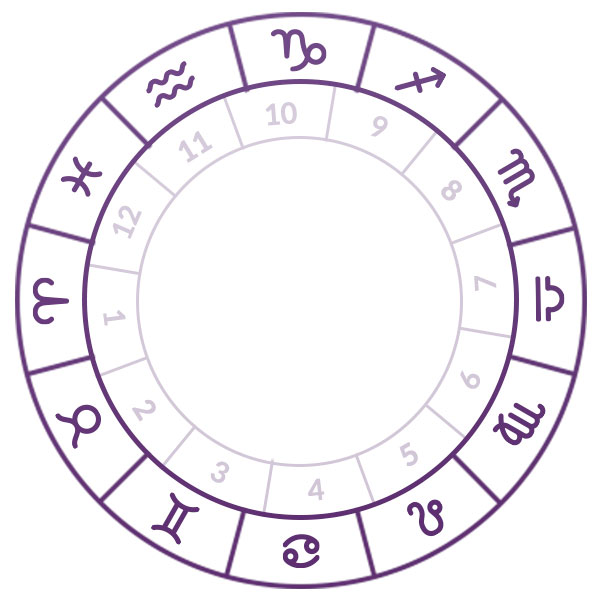
The outer circle of your chart shows the sign symbols. Each of them comprises 30° of the circle, forming the 360° zodiacal wheel. By looking at the planet symbols in the chart, you can see which sign and house they are placed in.
Remembering, the planets represent the energies of our psyche and the signs are responsible for setting the tone for them. It's what will make the modes of operation different from each other.
We can say that the signs give personality traits to the planets and are the most publicized and popularized subjects in the astrological world, where many times we only hear about them and not the planets and houses in informal conversations with little knowledge about the subject. Therefore, it is quite common that there are shallow interpretations about the characteristics of each of the twelve signs.
To learn more about each one of them, you can access our articles to learn what they really represent and how they work within astrological dynamics. We recommend this reading to deconstruct clichès and stereotypes, after all, Aries is much more than a hot-tempered sign, Taurus is more than feeling hungry, etc.
Categorizing signs quickly
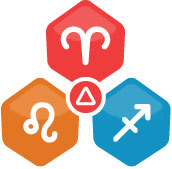
Fire
Aries, Leo and Sagittarius share an active and innovative energy, as they are governed by the Fire element, of Yang / Masculine polarization.

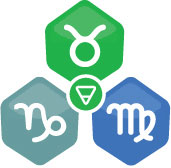
Earth
Taurus, Virgo and Capricorn enjoy a taste for order, security and mastery over matter, as they are governed by the Earth element, of Yin / Feminine polarization.

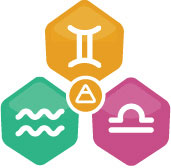
Air
Gemini, Libra and Aquarius are moved by intellect, reason and communication, precepts of the Air element, of Yang / Masculine polarization.

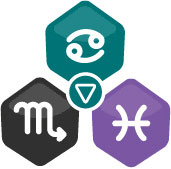
Water
Cancer, Scorpio and Pisces are enveloped by the emotions, depth and sensitivity inherent in the Water element, of Yin / Feminine polarization.
How to interpret the Houses in the Birth Chart
In a birth chart there is also another subdivision, that of the twelve astrological houses. In the map design, they vary in their size, as this has to do with the place and time of year of your birth. It is the innermost circle, just below the division of signs.
An astrological house (also called mundane house or field of experience) is an area of life, of personal experience. While the planets are parts of our psyche and the sign they are placed in show what traits these parts take on, the houses show the areas of life in which this set is most able to manifest itself.
We must analyze which planets and signs are in each house in order to understand what their effect is on the areas of our life.
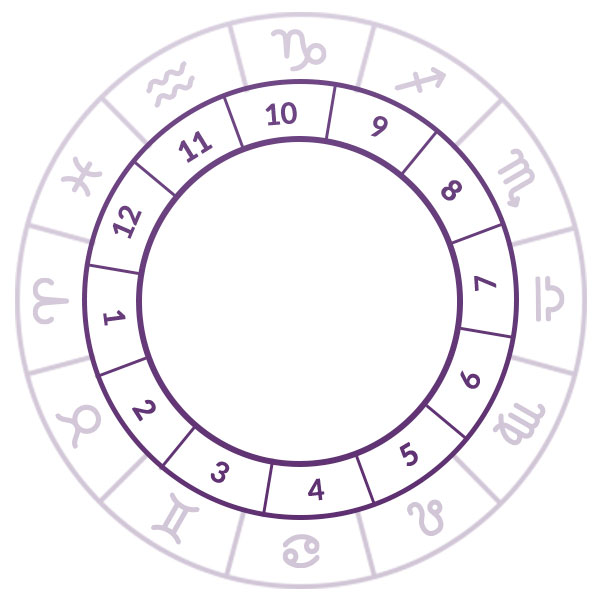
There are also some axes, crosses in the birth chart, the cardinal cross being the most important. This cross takes the cusps (beginnings) of the 1st, 4th, 7th and 10th houses.
.jpg) Ascendant (or cusp / beginning of the 1st house)
Ascendant (or cusp / beginning of the 1st house)
It is the point that starts the first house of the chart. Opposite him is the so-called Descendant, or cusp of the 7th house. It is our persona, our opening window to the world, our mask and how we are seen in the first instance.
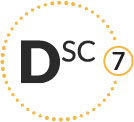 Descendant (or 7th house cusp / beginning)
Descendant (or 7th house cusp / beginning)
Describes how we see others, what we project onto others, our partnerships, what attracts us and what we look for in a partner. It also says a lot about projections, what we end up projecting onto others and the quality of the relationships we attract into our lives. Depending on the planets involved, such an area can be more fluid or tense.
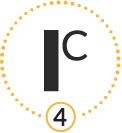 Bottom of Heaven (or cusp / beginning of 4th house)
Bottom of Heaven (or cusp / beginning of 4th house)
Describes where we come from, our roots, family, our home, the foundation of who we are, our childhood and the last part of life. It is said that for the Midheaven, the crown of your tree to function fluidly and obtain good visibility, the roots must always be well planted in the ground and well nourished.
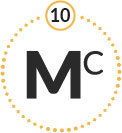 Midheaven (or cusp / beginning of the 10th house)
Midheaven (or cusp / beginning of the 10th house)
It is our reputation and public image. It's where we're going, where we're striving to be, who we want to become and what we want to contribute to the world. It is part of our social role and deals with the goals and achievements that we strive for or are more predisposed to achieve.
How to read Aspects in the Birth Chart
After understanding how the planets, signs and houses are associated, we move on to a very important second stage of our interpretation: understanding what the aspects are and how they influence our birth chart. As we said, the planets are the protagonists of our birth chart, therefore, the relationship between them cannot be left out of the interpretation.
Aspects are the relationship between two planets. They are analyzes of how one planet interacts with another and what is the affinity of the energies that are being exchanged according to the position they occupy in our birth chart. For example, if we say that in a given chart, Venus is in conjunction with Mercury, it means that both planets are positioned side by side, in the same sign and in an orb (distance in degrees) possible. But, if we say that Venus is in Opposition with Mars, it means that both planets are situated in opposite signs, 180 degrees away from each other, as for example, Aries and Libra.
Aspects are crucial and, possibly, the most reliable part of the interpretations, as their interaction depends solely and exclusively on the orb of the planets and does not change the way they are generated within the construction methods of the maps, unlike the houses, which can undergo alterations of according to the technique used.
Knowing a person's strongest planetary aspect can say a lot about them and give a different tone to the other different interpretations of the chart. For example, a person may have the Sun in Aries in addition to other more proactive or dry placements. But, if she has the Moon in conjunction with Neptune, for example, she is unlikely to be a cold or harsh person, as her emotional sensitivity can gain a lot of prominence in her personality.
Aspects can be fluid or difficult. We have an interesting article that explains how aspects work, but for now, here's a summary of the main aspects (called Major Aspects) that can be found in a birth chart:
Conjunction
It is the most powerful aspect, which combines the strength of two planets, which tend not to know how to act alone, but always together with the other. Depending on the planet and the sign where they occur, it can be easy or challenging.

Opposition
It is a very powerful aspect of tension and one that puts the energies of two planets in conflict. As the name says, opposite to each other and basically mean projection. His action usually takes place in conflict with the other and not with internal concerns.

Trine
It is the strongest aspect among the fluids and makes the planets work more naturally, enriching each other. The help provided tends to be very visible in the person's life, where things happen more easily.

Quadrature
It is an aspect of tension that makes the relationship between the planets difficult. It causes an inner difficulty that can also be visible, as if the energies cannot work together, only one at a time.

Sextile
It is a favorable aspect that increases the harmony and complementarity between the signs. It is less intense than the trine and its action generates opportunities that must be taken advantage of for the influence to work satisfactorily.
Performing a synthetic analysis
Making a "summary" of the Birth Chart is a rather thankless task, as we have to try to analyze all the information and fish out the areas of greatest influence, which really stand out. This does not mean that we are going to throw the rest away, but the synthesis of a birth chart aims to bring together its different influences and energies in a coherent way, making the reading more objective and focused.
Making the first summary can be more complicated: what to look for and how to interpret what was found? With time, practice makes reading more efficient and natural and just by looking at it, we will know what we need to highlight and elucidate.
It also helps a lot to set up a personal system to assist in this data collection and interpretation process. Below we will show a method used by some astrologers to obtain an efficient birth chart synthesis, but you can build your own method based on your unique perception.
Below you can see some basic concepts for you to start a faster analysis of an birth chart, but know that there is no method "more correct" than the other: the analysis of a map will always depend on crossing the basic characteristics of the archetypes with a subjective interpretation, arising from their own experience, intuition and common sense.
Tasting
Start as if you were doing a real tasting. As we do with a wine, observing its color, smell and particularities after the first sip, look at the map looking for outstanding characteristics. Take your time, take a deep breath and take your time. See each of the houses and planets, which major and most influential aspects are happening (mainly with the angular houses, 1, 4, 7 and 10), the qualities, elements and distribution between the two hemispheres, in short, everything that can help to define the peculiarities of the map and where the highest energy concentrations are. The aim is to get a general first impression and write down anything relevant.
Organization
Make a list of the most important areas of life, such as relationships, work, career, money, communication, faith, creativity, fun, family, health, talents, etc. Separate everything you think is essential and what are the most relevant information to be obtained and transmitted. Observe each astrological house, which signs occupy the cusps and what kind of influences they bring, making small observations about each one.
Try to understand each point
See which house the Sun occupies and which sign it is in. Then, which house the Moon occupies, and which sign it is in? Then go a little deeper into the remaining details:
- See the condition of the Ascendant (the cusp of the 1st house) and all aspects and planets that are close to it. This is the most important angular house in a birth chart;
- See which planet governs the ascendant, which house it occupies, and which sign it is there;
- Then, analyze the sign that is in the Midheaven (the cusp of the 10th house), a very important house because it is your social image, reputation and aspirations in life;
- The same goes for personal planets: Mercury, Venus and Mars; the social ones: Jupiter and Saturn and the transpersonal ones: Uranus, Neptune and Pluto, the latter being more relevant for the analysis of houses and aspects;
- Move then to the Lunar Nodes, an area that governs your comfort zone and is linked to your personal evolution;
- Finish by analyzing Chiron, the other asteroids, the Arabian parts, and more secondary and advanced things, if you wish.
Add your personal touch
Now you must mix everything you have managed to find with your own personal insights, writing each thing down along with your subjective interpretation. To do this, look at the signs, planets and aspects you found. Although you are doing a quick analysis, take the time to write down everything that you think is important and what was the astrological basis used in your subjective view. Write down general information about the birth chart in question.
Resolving Conflicts
If everything went well up to this point, you are on the right track to synthesize all the data obtained, but first you must work on existing conflicts. Cross-check your notes for conflicting interpretations and separate them. After finding all possible contradictions, you need to determine which information is most accurate and consistent with the person's reality and personality. Conflicts will always exist within the astrological scope and it is up to the astrologer to try to resolve them in the best possible way.
For this, combine all your astrological knowledge and your intuition to discover which influence is greater and more aligned with the personality of the person in question. Observe the intensity of planets and aspects, if any energy is being blocked or redirected, which may be weaker or stronger... The person himself can disguise some influences in his life, after all, we all use some mask to become more sociable or we struggle against certain characteristics to achieve certain goals. Thus, these contradictions should not always be eliminated, only rethought to find out how they fit into the individual's experience.
Finishing the analysis
Ok, if you managed to align all the contradictions and make several relevant notes, you achieved your purpose, which was to generate a synthesis of the entire birth chart, discovering the energies that most influence the individual and painting an overview of their characteristics, fluencies, tensions and path of life. If you are still not completely sure of the results obtained, continue exploring and studying the map until you feel that your interpretation is as correct and complete as possible.
Now you know how to read your birth chart!
After reading our guide and understanding how to read a birth chart, you are better prepared to know what the stars have to say about you and the people around you. It is worth remembering that a birth chart is like a fingerprint astrology, the crossing of all this information tends to generate a unique and very specific scenario for each one of us and this is one more reason why we should be careful with stereotypes of the signs.
Furthermore, we must always remember that the stars play a very important role in our lives, but that there are many other factors that contribute to the development of our personality, such as the context in which we grow up, the people we interact with, the genetic factor and above all, free will. Astrology appears as a guide that can help our self-knowledge and for that we need to use it wisely.
It is also worth remembering that, although we are increasingly seeking a better understanding of astrology and our astrological experience according to our birth chart, it is always important to consult an experienced, reliable and professional astrologer at least once in your life. A private consultation, face to face, especially when we are beginners, can be something that really adds to our self-knowledge.
What is the next step?
You still don't know what your birth chart looks like? Don't worry, because here at Astrolink you have access to your map quickly and simply. You just need to know your birth information: exact date, time and place.
Make your Complete Birth Chart now and enjoy all the tips we've given you to learn much more about yourself! Share this guide on social networks so that all your friends can also get to know themselves better.

